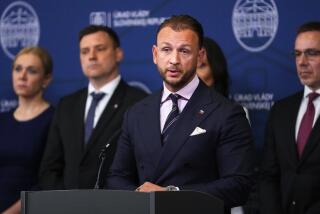Elections Seen as Crucial Point for Fledgling Slovakia
- Share via
BRATISLAVA, Slovakia — Critics say Prime Minister Vladimir Meciar of Slovakia runs an authoritarian political machine based on patronage, corruption, heavy-handed pressure and disrespect for democratic rules.
But such rebukes didn’t seem to concern his mostly gray-haired supporters at a rally early this week ahead of crucial parliamentary elections today and Saturday.
They cheered Meciar as a hero, a talented leader and a patriot who led their nation to independence. At one point, in a demonstration of public adulation reminiscent of the Communist past, they broke into chants: “Long live Meciar!”
More than five years after Meciar led his nation out of the old Czechoslovakia, this election--and the political maneuvering that follows--will determine whether Slovakia moves toward harsher authoritarian rule or fuller democracy and quicker entry into key European institutions that so far have balked at opening their doors to Meciar’s government.
If the election is seen as free and fair, and if whoever wins goes on to form a stable government under constitutional procedures, that would strengthen the tide of democracy in the former Soviet Bloc.
But if the election is badly flawed, or its results ruled invalid, or Meciar loses but finds a way to hang on to power--all scenarios feared by his critics--Slovakia could see a sharper rollback of democracy and find its integration into mainstream Europe even further out of reach.
“Our Prime Minister Meciar is the kind of person who is very dangerous, because he’s sort of a dictator, and he does what he wants,” Jana Balazova, a 19-year-old university student, said this week while attending a get-out-the-vote rally where the youthful crowd was heavily anti-Meciar. “Young people support the opposition because they have an idea what Meciar is all about, and they are afraid the former regime will sort of come back.”
Slovakia has missed the fast track for joining the North Atlantic Treaty Organization and the European Union largely on the grounds that under Meciar it has not been sufficiently democratic. Meanwhile, the Czech Republic, Poland and Hungary--countries that five years ago Slovakia saw as its peers--are rushing ahead toward NATO membership and greater integration into Europe.
“It is not evident that this government feels itself constrained by democratic institutions, laws and the constitution,” explained a Western diplomat who requested anonymity. “It is inconceivable to me that a government that pursues [current] policies could lead Slovakia into any of the institutions it wants to join.
“The stakes are high in changing Slovakia’s course sometime soon,” the diplomat added. “We’d be much happier to see Slovakia securely anchored in Western institutions, prosperous and peaceful, than to see it become a kind of ‘exception’ state--a state governed by an autocratic government that’s increasingly undemocratic.”
Meciar Accused of Questionable Acts
The diplomat rattled off some of the most glaring examples of what he said were nondemocratic actions by Meciar’s government:
* Failure to properly investigate the 1995 kidnapping of Michal Kovac Jr., and granting of a blanket amnesty to the unknown perpetrators. The victim’s father, Michal Kovac, was then president and a Meciar rival. The case is both complicated and murky, but was widely believed to involve efforts to politically embarrass the elder Kovac. A report by the U.S. Commission on Security and Cooperation in Europe noted that the first police investigator in charge of the case was removed after he said he found evidence implicating the government’s intelligence service, and his successor was removed after concurring in that view.
* Failure to properly investigate the 1996 car-bomb slaying of Robert Remias, a businessman who was reported to have evidence implicating the intelligence service in the Kovac kidnapping.
* Expulsion of former ruling party member Frantisek Gaulieder from parliament in 1996 when he defected to the opposition, and failure to reinstate him after the Constitutional Court ruled the action illegal. “He wasn’t just ousted from parliament,” the diplomat added. “A bomb went off across the street from his home the next night.”
* Refusal to include in a 1997 referendum a question on changing to a system of direct elections for president, even though the Constitutional Court ruled that the issue belonged on the ballot. “When it’s convenient to the government, it simply refuses to obey decisions of the court,” the diplomat said.
In the eyes of some in the opposition, abuse of power by Meciar means that the “Velvet Revolution”--which in 1989 peacefully overthrew communism in Czechoslovakia, set the stage for the breakup of the nation, and ushered in an era of democracy in the Czech Republic under former dissident and current President Vaclav Havel--now must be fought a second time in Slovakia.
Zita Furkova, a prominent actress, told an opposition rally that she was “sad that after 10 years we again have to ask for our freedom and for a state where the constitution is respected.”
Many former dissidents who helped overthrow communism are now in the opposition. The key individuals backing Meciar, a former Communist, are for the most part businesspeople made rich by a program of selling off state industry at minimal price to government supporters.
Different Views on Privatization Efforts
Critics see Meciar’s privatization program as little more than thinly disguised stealing of state assets by the prime minister’s cronies. But Meciar’s fans view the effort through a different prism.
“Everything he has done has been good for Slovakia,” said Daniela Psotova, a 56-year-old kindergarten teacher. “I like it that he didn’t sell the largest companies to foreign owners. Slovaks own them, and this creates jobs.”
Indeed, at least on the surface Slovakia has fared well economically under Meciar’s stewardship, with growth last year at 6.5%. Critics say a burst of inflation or currency devaluation is just around the corner, and that the government budget for such items as health care and education is woefully inadequate.
Polls show that Meciar’s party--the Movement for a Democratic Slovakia, which rules with two minor partners--is likely to finish first in voting but fall short of a majority. Four opposition parties that have pledged to work together to form a new government have been getting about 60% support from respondents in surveys. Seats in the 150-member single-house parliament are assigned on a proportional basis to all parties that win at least 5% of the votes.
Under the constitution, Meciar will get the first crack at forming a new government if his party wins more votes than any other single party. But if the results match the polls, he will not have the parliamentary votes to succeed, and the opposition should then get a chance to name a prime minister.
Mikulas Dzurinda, head of the strongest opposition party, the Slovak Democratic Coalition, is seen as the likely prime minister if the opposition takes power. His politics lean to the right, but the opposition includes politicians and parties of both the left and right, united behind the anti-Meciar banner.
Opposition Groups Claim Shared Goals
Leaders of the various opposition parties acknowledge they may have policy arguments if they form the new government, but they insist a shared desire for democracy--and for integration into European institutions--will hold them together.
A flood of foreign observers from the Organization for Security and Cooperation in Europe and other groups has descended on Bratislava, the capital, in hopes of ensuring that the balloting and vote-count are honest.
The Western diplomat expressed confidence that the foreign observers would detect “any substantial fraud.” But, he said, “the larger question may be: Does the government care if fraud is detected?” The diplomat added that he wasn’t sure Meciar would just quietly leave office if he loses.
The government rejects foreign criticisms as biased and unfair. Most Meciar supporters don’t really care what outsiders think. For them, an indefinite delay in joining European institutions is not as important as the thrill of being a truly independent nation for the first time in Slovakia’s troubled history. Incorporated into the Hungarian and Austro-Hungarian empires for many centuries, Slovakia had a brief existence as a Nazi puppet state, but other than that has been independent only since Jan. 1, 1993.
“Slovakia waited 1,030 years to be independent,” said Meciar supporter Peter Krajcovic, 65, noting with resentment that his parents had been forced to attend Hungarian-language schools under the Austro-Hungarian Empire.
But even though Slovaks in general have accepted that their independence now is permanent, back in 1992 it was not clear that a majority even wanted to break with their Czech cousins.
“The nationalistic movements for the split were not for democracy,” said Martin M. Simecka, a Slovak and former dissident writer who backed the peaceful 1989 revolution but not the breakup of Czechoslovakia. “For me, democracy was much more important than an independent country.”
Once Slovakia became independent, with Meciar as its leader, “Slovaks had to fight alone for democracy,” Simecka said. “We’ve lost years and years in this battle, and it still is not at an end.”
More to Read
Sign up for Essential California
The most important California stories and recommendations in your inbox every morning.
You may occasionally receive promotional content from the Los Angeles Times.









